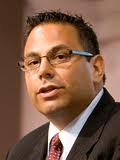Brown v. Board of Education opened many doors of opportunity, but too many remain closed. School choice can open some more.
Longtime school choice advocate Howard Fuller and a high-profile panel will reflect on that theme tonight at a National School Choice Week event in South Florida. To watch it live, just come back and view it here at 6:15 p.m.
You can also keep tabs via Twitter @redefinedonline. Search for #SCW and #FLschoolchoice.
In the meantime, here are some more thoughts on the links between Brown v. Board and school choice from some of the panelists you'll be hearing from.
T. Willard Fair, former chairman, Florida Board of Education; president, Urban League of Greater Miami:
While we were victorious in fighting for school choice nearly 60 years ago, the struggle continues. Choice is still an issue for many low-income children who come from the wrong side of the tracks. The Urban League of Greater Miami has made education and school choice the focal point of its work for over 50 years because access to quality education is still one of the most pressing civil rights issues of our times. This is not to sound somber or overly critical of the great strides we have made with Brown vs. Board of Education. However, we cannot be ignorant to believe that the victory of 60 years ago assuaged all of our “Black or Brown” educational issues. The need to access quality education is still alive and evident in Florida with more than 60 percent of Black children reading below grade level. (more…)
 This week, we posed that question to many of you on Twitter and got an amazing response: more than 1,000 tweets!
This week, we posed that question to many of you on Twitter and got an amazing response: more than 1,000 tweets!
In the meantime, we also posed it to some stalwarts in the school choice movement, and asked them to write a short blog post in response. Next week, we’ll begin publishing their fun, thoughtful and provocative answers.
Here’s the all-star line-up:
Monday, Dec. 23: Jon Hage, founder and CEO of Charter Schools USA.
Tuesday, Dec. 24: Robert Enlow, president and CEO of the Friedman Foundation for Educational Choice.
Thursday, Dec. 26: Joe McTighe, executive director of the Council for American Private Education
Friday, Dec. 27: Dr. Howard Fuller, board chair, Black Alliance for Educational Options
Monday, Dec. 30: Julio Fuentes, president and CEO, Hispanic Council for Reform and Educational Options
Tuesday, Dec. 31: Peter Hanley, executive director, American Center for School Choice
We hope you enjoy the posts as much as the #schoolchoiceWISH event. It was a hit! (more…)
Grad rates rising: Florida’s grad rate jumped nearly 4 percentage points in 2012, to 74.5 percent, the biggest one-year jump since 2003, the Orlando Sentinel reports. Full DOE report for districts and individual schools here. The DOE press release announcing the news was sent out at 5:42 p.m. Friday and that, unfortunately, may have limited coverage. Coverage from Gradebook here and here. Sherman Dorn’s take here.
College remediation rates still too high. StateImpact Florida, first in a series.
That charter school again. NorthStar High School, the same failing Orange County charter school that gave its principal more than $500,000 as it was closing its doors, also paid her husband more than $460,000 over a five-year period, the Orlando Sentinel reports.
Praise for Florida’s reforms. And bipartisanship. Julia Johnson, a former state Board of Education member, writes on both in USA Today.
Zoning woes in Palm Beach. One parent upset about proposed boundary changes for a popular elementary schools tells the Palm Beach Post: “We moved specifically to put our daughter into a better school.” A school board member who represents the school, meanwhile, says dozens of parents are “faking” their addresses so their children can attend.
Politicians eager to gain or retain the trust of Hispanic voters should focus on education and put particular emphasis on expanding school choice, suggests Julio Fuentes, president of the Hispanic Council for Reform and Educational Options, in an op-ed in today's South Florida Sun Sentinel. Here's a snippet:
We know that education reform and school choice are top issues for Latinos, second only to jobs and the economy, based on the HCREO/AFC poll released this past summer of voters in five key battleground states including Florida. The poll found that education is a top-tier issue for battleground voters and Latinos – even more important than immigration, in some cases. The poll found that Latino voters in Florida, Arizona, New Mexico, Nevada, and New Jersey are more likely than voters overall to cite improving education and increasing education options as core priorities.
Both presidential candidates stressed on election night that those in office must now work jointly and in a non-partisan way to address the great civil justice issues of our time. These issues include immigration, reducing the gap in quality educational opportunities for minorities, expanding school choice options so that all students regardless of zip code or socioeconomic background have a chance to excel. According to national data from the Pew Hispanic Center, only about 13 percent of Hispanic 25- to 29-year-olds complete at least a bachelor's degree, compared with 39 percent for whites in the same age group and 53 percent for Asians. This gap cannot persist.
(Full disclosure: Fuentes is a member of the board of directors for Step Up For Students, which co-hosts this blog.)
 Editor's note: Julio Fuentes, president of the Hispanic Council for Reform and Educational Options, sent this email blast out earlier today.
Editor's note: Julio Fuentes, president of the Hispanic Council for Reform and Educational Options, sent this email blast out earlier today.
Governor Rick Scott made the right call in declaring "unacceptable" the race-based achievement goals outlined in the Florida Board of Education's recently released five-year strategic plan.
The Hispanic Council for Reform and Education Options (HCREO) believes that the Board's plan is not merely unacceptable; it is insulting and counterproductive to the education needs of all Florida children. Just as politics should not drive our education system, race and ethnicity should not determine the expectations we set for our students. Education reform - including the choices we give to students and their parents - is about the capacity of our youth to achieve when given the proper classroom tools and instruction.
The state's plan outlines that by 2018, 90 percent of Asian students, 88 percent of white students, 81 percent of Hispanic students and 74 percent of black students should be reading at or above grade level. For math, the goals are set at having proficiency levels of 92 percent for Asian students, 86 percent for white students, 80 percent for Hispanic students, and 74 percent for black students.
To set these different bars for students is to say, effectively, that we believe one group is capable of achieving more simply because of their skin color and ethnic background. That approach might have reigned back in the days of segregated classrooms, but it has no place in today's classrooms.
In case the Board of Education isn't aware: We are living in 2012. The nation's first black President is running for re-election. Louisiana's governor is Indian. The mayor of San Antonio, Texas made history this summer when he became the first Hispanic to give the keynote address at the Democratic National Convention. These successful leaders did not achieve because of, or in spite of, the skin color and families into which they were born. They succeeded because they had education and support from teachers and others who believed in their abilities.
Every student in every Florida classroom today deserves the same. (more…)
John Giotis, a Republican activist who heads a Catholic school in St. Petersburg, Fla., is among 15 people named to a new National Educators for Romney group.
The 15-member group is headed by Rod Paige, who served as U.S. Secretary of Education during President George W. Bush's first term.
Giotis, headmaster of The School of the Immaculata, was among the social conservates in Florida who sided with Romney in the Republican primary. He is the latest Floridian to assume a high-profile position in Romney's education circle. Jeb Bush wrote the forward to Romney's education plan. Former Florida Board of Education Chair Phil Handy co-chairs one of his education policy advisory groups. And Julio Fuentes, president & CEO of the Hispanic Council for Reform and Educational Options (as well as a Step Up For Students board member), serves on an ed policy committee.
A Romney campaign said the new group will lead efforts to support "Romney and his bold education reforms that will put students first."
Paige said in the release: "I’ve worked with Republicans and Democrats to bring quality education to all of our children, and I can say with authority that Mitt Romney understands the reforms this country needs. For too long, we’ve watched as our most disadvantaged children have been denied the one tool they need to rise from poverty and live a successful life—a world-class education. Mitt Romney has proposed real reforms that will finally bring the change we need and that our children deserve. In Chicago, we are seeing again that entrenched special interests will oppose those efforts, but Governor Romney is a leader who can overcome that opposition. I am proud to support him in this endeavor.”
 If President Barack Obama and Mitt Romney want to win over Latino voters, a new survey of five battleground states suggests they do two things: Talk up education. And emphasize school choice.
If President Barack Obama and Mitt Romney want to win over Latino voters, a new survey of five battleground states suggests they do two things: Talk up education. And emphasize school choice.
More than voters in general, Latino voters are more likely to say education is a leading issue, just behind the economy and jobs, found the survey, released Tuesday by the American Federation for Children and the Hispanic Council for Reform and Educational Options. The survey also found Latino voters are more likely than voters in general to support vouchers, tax credit scholarships and education savings accounts.
For instance, while 57 percent of likely voters said they supported vouchers, 69 percent of Latino voters did.
“Unfortunately a lot of our Latino families come from low-income areas (where) choice is the only way that they are going to be able to achieve that American dream, graduate high school and go on to make something of themselves,” Julio Fuentes, president and CEO of HCREO (and a Step Up for Students board member) said in the redefinED podcast attached below.
The survey results suggest both Obama and Romney will have challenges swaying Latino voters.
For Obama, it's a matter of position. The president has endorsed school choice options such as charter schools, but has stopped short of backing vouchers and tax credit scholarships. For Romney, it's a matter of emphasis. Hard-line positions on immigration may fire up the Republican base, but it's not a top-tier concern for Latinos.
"The immigration debate from a national level has taken the spotlight. And this educational crisis that we find ourselves in, especially within our Hispanic community, just seems to never be discussed," Fuentes said. "In a professional, politically roundabout way, we asked our candidates, President Obama and Gov. Romney, to basically give us their take. What's their plan when it comes to the Hispanic educational crisis?"
The survey was conducted with likely November voters in Florida, Arizona, Nevada, New Jersey and New Mexico. You can see the full results here.